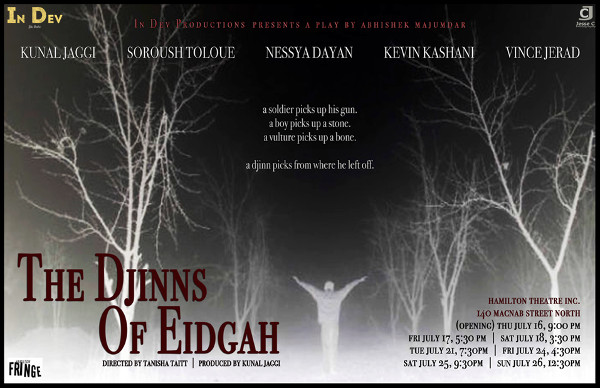
To clarify, according to the show's program, the Djinn, "in Arabian and Islamic mythology, is a spirit able to appear in human form and/or possess others." And an Eidgah is "an open-air mosque to perform prayers on the Muslim festival of Eid."
The Djinns of Eidgah is set in the Kashmir Valley, seemingly a few decades ago. For those unfamiliar with its history, the disputed area of Kashmir has been divided between India and Pakistan since a ceasefire was declared in 1948, ending the Indo-Pakistani war of 1947-1948. Kashmir Valley is largely Muslim.
As someone who is interested in British colonial and postcolonial events, and has researched and written historical fiction about conflicts relatively unfamiliar to today's Canadians, I had high hopes and expectations for this drama. I looked forward to getting new insight into how to present such material a North American audience, whose first response is as likely as not to be: "why should I care?"
Performed with great energy and genuine enthusiasm, The Djinns of Eidgah is rather hampered by its sheer complexity and detail, with a valiant attempt to weave individual stories and subplots into a whole that unfortunately features no clear protagonist, no clear antagonist, and no clear theme, other than that war, conflict and sectarian violence are severely harmful to families and individuals.
In furthering its chosen theme, countless tortures are both recounted by exposition and realistically depicted on stage, horrors perpetrated or provoked both by individual Indian soldiers and by the young Muslim protestors of the region.
The drama starts on a high and rises to fever pitch at the end. There are intense disagreements among the characters and nightmarish happenings.
Five actors depict seven characters: two Indian soldiers, somewhat isolated and left to fend for themselves in a hostile community; two young men bent on ousting the Indian occupiers of their land; a troubled young woman-the most engaging of the characters-sister of one of the young men; and her psychological counsellor, a doctor who has lost his son in the endless conflict. The seventh character is the Djinn, the spirit that fulfils a surreal element to the unfolding drama.
Regretfully, in its present format, this show may not appeal to everyone.
You must be logged in to comment.
There are no upcoming events right now.
Why not post one?